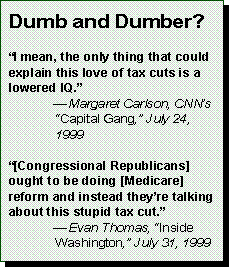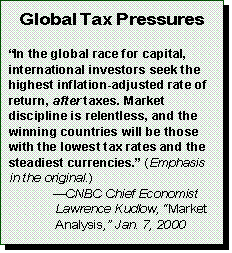 |
||||||||||||||||||||||||
|
||||||||||||||||||||||||
 |
||||||
|
||||||
 |
||||||||||||||||||
|
||||||||||||||||||
 |
|||||||||
|
 |
||||||||||||||||||||||||
|
||||||||||||||||||||||||
 |
||||||||||||||||||||||||
|
||||||||||||||||||||||||
|
What The Media Tell
Americans About Free Enterprise 
There They Go Again Throughout Campaign 2000, TV’s talking heads will pass judgment on the presidential candidates’ economic programs, including their positions on tax cuts. But if last year’s coverage is predictive of this year’s spin, journalists will once again portray tax cuts as little more than vote-getting schemes that risk renewed budget deficits and threaten the long term solvency of expensive government programs. Two years ago, in a Special Report for the Free Market Project, Tim Lamer concluded that "network news reports generally portray tax cut proposals as election-year sops to the wealthy at the expense of the poor." They still do. Reporters last year criticized a tax cut plan offered by GOP candidate George W. Bush, a tax cut plan offered by congressional Republicans, and even the tax cut promoted by Ronald Reagan a generation ago -- in spite of the robust body of evidence accumulated by free market economists that shows that tax cuts benefit the economy and that Americans are more heavily taxed than ever. In an ostensibly straight news report on July 29, 1999, CBS’s Diana Olick offered this skewed version of recent economic history, "In 1981 Ronald Reagan signed the largest tax cut ever, sold as an economic stimulus. It resulted in a decade and a half of deficits but gave Reagan eight years of political popularity." While it’s true that Reagan was popular (though not for the entire eight years of his presidency), Olick’s other assertions are little more than shopworn media myths. According to a detailed analysis by the Cato Institute, the 1981 tax cuts were only a minor factor in the increasing budget deficit; the primary reasons were a large increase in the defense budget and an unexpectedly sharp drop in inflation during the 1981-82 recession. Olick also neglected to mention the positive benefits of Reagan’s tax cuts, including strong economic growth, declining unemployment, a booming stock market and dramatic increases in real median family income during the 1980s. In an effort to reduce those deficits, Presidents Bush and Clinton each advocated tax increases, in 1990 and 1993, respectively. Both times, reporters helped the politicians portray the increases as nasty but necessary economic medicine. On February 13, 1993, for example, then-CBS News correspondent Linda Douglass recounted, "In his weekend radio address, Mr. Clinton told Americans to brace themselves and get ready to sacrifice, as part of what he called a patriotic duty to restore the economy." Those deficits are now history, though there’s still a dispute about just what did the trick -- conservatives point to productivity gains traceable to Reagan’s reduction of the top individual income tax rate from 70 percent to 28 percent, while most liberals credit Clinton’s "shared sacrifice" economic policies. Clinton’s 1993 tax increase established a new top individual rate of 39.6 percent, up from the 31 percent set in 1990. Six years later the red ink is gone, but the higher rates remain -- and the media elite don’t seem eager to send taxpayers a refund check for all their years of sacrifice.
The following week, on Inside Washington, host Gordon Peterson asked Newsweek’s Evan Thomas about the same across-the-board tax cut ridiculed by Carlson. "A package of nearly $800 billion in tax reductions that some Democrats described as irresponsible, crazy, a boondoggle for the rich," Peterson said. "How would you describe it, Evan?" "I’m with the Democrats on this one," Thomas replied. "I think they ought to take that surplus, put a fence around it and keep it for the entitlement programs because we’re going to need it." Thomas continued, "This is the absolute prime moment when they ought to be doing [Medicare] reform and instead they’re talking about this stupid tax cut." Lost in that argument was the average American whose taxes have risen an average of 30 percent since 1993. According to data compiled by the Tax Foundation, the typical taxpayer paid $7,025 in combined federal taxes last year, up from 5,438 in 1993 (measured in constant dollars). Under the GOP plan, government revenues wouldn’t have been starved; the tax cut that Carlson and Thomas decried would have meted out reductions of just 0.4% in 2000, 0.9% in 2001 and 1.8% in 2002, while the national debt would still have been reduced by nearly $2 trillion over ten years, according to Cato’s Stephen Moore. Meanwhile, increased payroll revenues -- a consequence of robust economic growth -- have helped delay Medicare’s expected insolvency date to 2015. Clinton vetoed that particular tax cut in September, but GOP presidential candidate George W. Bush offered his own plan in early December. Once again, the media mobilized. Writing in the December 13 issue of Newsweek, Jonathan Alter echoed his colleagues’ antipathy towards tax relief as he portrayed Bush’s proposal as a gift to the rich. "Current GOP dogma says the wealthy must be served," wrote Alter. "The bulk of the Bush cut -- which would bust the budget under today's Congressional Budget Office surplus projections -- is directed toward the richest slice, who have gotten a lot richer in recent years." Actually, the government itself has gotten a lot richer in recent years by inordinately taxing that "richest slice" of American earners. The top percentile of Americans pay about a third of all federal taxes, even though they only account for 16 percent of total income, reports Cato’s Moore. "The top 1 percent pays more federal income tax than the entire bottom 50 percent," says Moore, "which is why the wealthy get a bigger tax cut." Even so, the richest Americans would still face a top rate of 33 percent under the Bush plan, higher than when his father left the White House in early 1993. Alter also suggested that Americans should continue to be overtaxed to prevent the Gross Domestic Product (GDP) from growing too fast: "Almost any nonpolitical economist will tell you that a stimulative tax cut now might overheat the economy. It would also make it harder to find the money for a high-end tax cut when we need it -- to fight a real recession down the road." Alter is apparently oblivious to the contradiction of simultaneously predicting both out-of-control growth rates and a recession. It’s an everything-but-the-kitchen-sink approach -- throw every charge you can think of at a proposal, and just hope something sticks.
Schroeder’s plan would leave Germany with lower corporate tax rates than the U.S. and with no corporate capital gains tax. Given the modern-day mobility of capital, argues CNBC Chief Economist Lawrence Kudlow, "the United States... had better not rest on its laurels." "Sizable pro-growth tax cuts in Germany and Japan may threaten an erosion of U.S. competitiveness," writes Kudlow. "In the global race for capital, international investors seek the highest inflation-adjusted rate of return, after taxes. Market discipline is relentless, and the winning countries will be those with the lowest tax rates and the steadiest currencies." (Emphasis in the original.) TV viewers heard a lot of talking heads arguing against tax cuts last year. But the notion that Americans deserve a tax cut after years of "shared sacrifice," or warnings from economists that the U.S. needs a friendly tax environment to maintain its hold on highly mobile international capital, weren’t much in evidence in the national media during 1999.
Home | News Division
| Bozell Columns | CyberAlerts |
||||




 When
congressional Republicans offered an across-the-board tax cut last
summer, Time’s Margaret Carlson illustrated the bad press
that tax cuts typically receive. In a roundtable discussion of the
GOP tax plan on CNN’s Capital Gang on July 24, Carlson said,
"The vocabulary has changed so that tax cuts now look like
irresponsible spending and spending on investments and education and
Medicare looks like the responsible thing to do," adding that "the
only thing that could explain this love of tax cuts is a lowered
IQ."
When
congressional Republicans offered an across-the-board tax cut last
summer, Time’s Margaret Carlson illustrated the bad press
that tax cuts typically receive. In a roundtable discussion of the
GOP tax plan on CNN’s Capital Gang on July 24, Carlson said,
"The vocabulary has changed so that tax cuts now look like
irresponsible spending and spending on investments and education and
Medicare looks like the responsible thing to do," adding that "the
only thing that could explain this love of tax cuts is a lowered
IQ." In
fact, there’s a new argument brewing in favor of sizable tax cuts.
Worried about competition from the strong U.S. economy, and faced
with sluggish economic and job growth at home, German Chancellor
Gerhard Schroeder recently announced a proposal for major reductions
in Germany’s individual and corporate tax rates. This follows a
similar move by Japan about a year ago, a move which presaged the
start of that country’s rebound from a lengthy recession.
In
fact, there’s a new argument brewing in favor of sizable tax cuts.
Worried about competition from the strong U.S. economy, and faced
with sluggish economic and job growth at home, German Chancellor
Gerhard Schroeder recently announced a proposal for major reductions
in Germany’s individual and corporate tax rates. This follows a
similar move by Japan about a year ago, a move which presaged the
start of that country’s rebound from a lengthy recession.